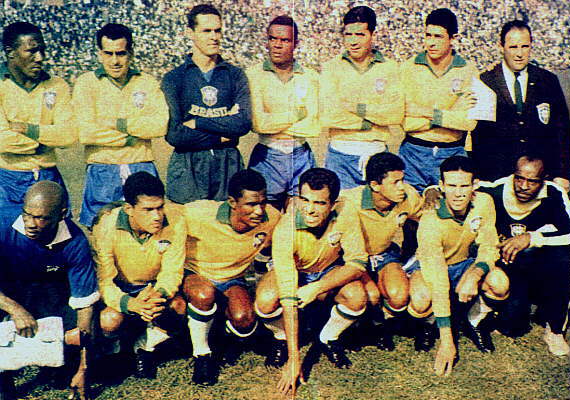Football in Brazilian culture holds immense importance in Brazilian culture, serving as a unifying force and a national obsession. It is deeply ingrained in the hearts of Brazilians, shaping their identity and fostering a sense of pride and unity. The historical background of football in Brazil showcases its evolution from a colonial pastime to a national phenomenon. Legends like Pelé and Neymar Jr. have emerged, solidifying Brazil’s reputation as a powerhouse in the football world. Popular football clubs, such as Flamengo and Corinthians, command unwavering loyalty from fans who live and breathe the sport. Football’s impact extends beyond the field, fueling economic growth and contributing to social cohesion in Brazilian society. The success of the Brazilian national team in international competitions, with numerous World Cup victories and iconic moments, further cements the country’s status as a football heavyweight. Football’s legacy in Brazilian culture is undeniable, continuing to inspire future generations and perpetuate its significance for years to come.
Overview of football’s significance in Brazil
Football holds immense importance in Brazilian culture, serving as a unifying force and a national obsession. It is deeply ingrained in the hearts of Brazilians, shaping their identity and fostering a sense of pride and unity. The historical background of football in Brazil showcases its evolution from a colonial pastime to a national phenomenon. Legends like Pelé and Neymar Jr. have emerged, solidifying Brazil’s reputation as a powerhouse in the football world. Popular football clubs, such as Flamengo and Corinthians, command unwavering loyalty from fans who live and breathe the sport. Football’s impact extends beyond the field, fueling economic growth and contributing to social cohesion in Brazilian society. The success of the Brazilian national team in international competitions, with numerous World Cup victories and iconic moments, further cements the country’s status as a football heavyweight. Football’s legacy in Brazilian culture is undeniable, continuing to inspire future generations and perpetuate its significance for years to come.
Historical background of football in Brazil

Football in Brazil has a rich historical background that traces its roots back to the late 19th century. The sport was introduced by British immigrants and quickly gained popularity among the working class. The first official football match in Brazil took place in 1894, marking the beginning of a new era. Over time, football became a symbol of Brazilian identity and a means of social mobility. It provided an escape from the struggles of everyday life and allowed Brazilians to showcase their skills on a global stage. As the sport grew in popularity, clubs were established, leading to the formation of organized leagues and competitions. This historical background laid the foundation for the immense significance of football in Brazilian culture today.
Brazilian Football Legends
Brazilian Football Legends:
- Pelé: Known as “The King of Football,” Pelé is one of the greatest players in history, winning three World Cups with Brazil and scoring over 1,000 career goals.
- Neymar Jr.: A modern icon of Brazilian football, Neymar Jr. has gained worldwide recognition for his skill and flair on the field, playing for clubs like Barcelona and Paris Saint-Germain.
These legends have left an indelible mark on Brazilian football and continue to inspire generations of players in the country.
Pelé: The King of Football

Pelé, also known as “The King of Football,” is revered as one of the greatest players in history. With three World Cup victories and over 1,000 career goals, Pelé’s impact on Brazilian football is immeasurable. His skill, finesse, and dazzling performances on the field have made him a true legend of the sport. From his humble beginnings to his remarkable achievements, Pelé’s legacy continues to inspire generations of Brazilian players, leaving an indelible mark on the country’s football culture.
Neymar Jr.: A modern icon of Brazilian football
Neymar Jr., a modern icon of Brazilian football, has captivated fans with his extraordinary skills and electrifying performances on the pitch. From his early days at Santos FC to his current role as a key player for Paris Saint-Germain and the Brazilian national team, Neymar Jr. has become a symbol of Brazil’s footballing talent and flair. His incredible dribbling, agility, and goal-scoring ability have earned him numerous accolades and a dedicated fan following. Neymar Jr.’s impact on Brazilian football continues to inspire young players and solidify his status as a true legend in the making.
Football Clubs in Brazil
Football Clubs in Brazil play a crucial role in the country’s sporting landscape. With a rich history and passionate fan bases, these clubs are the lifeblood of Brazilian football. Some of the most popular clubs include Flamengo, Corinthians, and Sao Paulo FC. These teams not only compete in domestic leagues but also participate in international competitions, showcasing the immense talent within Brazilian football. The fierce rivalry between clubs creates an electric atmosphere during matches, with fans showing unwavering support and loyalty. Football clubs in Brazil serve as hubs for talent development and provide a platform for players to excel on a global stage.
Popular football clubs in Brazil
Some of the popular football clubs in Brazil include Flamengo, Corinthians, and Sao Paulo FC. These clubs have a rich history and passionate fan bases, making them integral to the fabric of Brazilian football. They not only compete in domestic leagues but also participate in international competitions, showcasing Brazil’s football talent to the world. The fierce rivalries between these clubs create an electric atmosphere during matches, with fans showing unwavering support and loyalty. These clubs serve as hubs for talent development and provide players a platform to excel on a global stage.
Passion and loyalty of Brazilian football fans
Brazilian football fans are known for their unrivaled passion and unwavering loyalty to their teams. They fill stadiums with vibrant energy, creating an electric atmosphere during matches. The fans wear their team’s colors proudly, singing and chanting throughout the game. Their dedication goes beyond the stadium, as they support their clubs through thick and thin, celebrating victories and standing by their teams in times of defeat. Brazilian football fans are an integral part of the sport’s culture, adding an extra level of excitement and fervor to every match.
Influence of Football on Brazilian Society
Football in Brazil has had a profound influence on society. Its economic impact is significant, with the sport contributing to job creation and tourism. Football also serves as a unifying force, fostering social cohesion and strengthening national identity. The passion for the game transcends social and economic divides, bringing people together in support of their teams. Through football, Brazilians find joy, inspiration, and a sense of belonging. The sport has become ingrained in Brazilian culture, shaping the nation’s history and leaving a lasting legacy for future generations.
Economic impact of football in Brazil

The economic impact of football in Brazil is undeniable. The sport generates revenue through ticket sales, merchandise, and broadcasting rights. It also creates job opportunities in various sectors such as construction, hospitality, and marketing. Football attracts tourists from around the world, boosting the tourism industry. Infrastructure development for stadiums and training facilities further stimulates the economy. The sport’s financial influence extends beyond the professional level, with grassroots football programs benefiting local communities. Football’s economic significance in Brazil is a testament to its enduring popularity and widespread support.
Social cohesion and national identity through football

Football in Brazil plays a crucial role in fostering social cohesion and shaping national identity. The sport brings people from diverse backgrounds together, uniting them under a shared passion. Football matches create a sense of belonging and camaraderie among fans, strengthening community bonds. The success of the Brazilian national team on the international stage further instills pride and patriotism in the hearts of Brazilians. Through football, Brazil celebrates its rich cultural heritage and showcases its unity to the world, solidifying its place as a football powerhouse.
International Success of Brazilian National Team
The Brazilian national football team has a storied history of international success, earning them the title of the most successful national team in the world. With a record five FIFA World Cup victories, Brazil has become synonymous with excellence on the global stage. These victories, along with countless memorable moments and legendary players, have solidified Brazil’s reputation as a football powerhouse. The success of the national team has brought immense pride to the country and further strengthened the connection between football and Brazilian identity.
History of the Brazilian national football team
The Brazilian national football team has a rich and storied history. It was founded in 1914 and has since become the most successful national team in the world, winning a record five FIFA World Cup titles. The team has produced legendary players such as Pelé, Zico, Romário, Ronaldo, and Ronaldinho, who have left an indelible mark on the sport. These players, along with many others, have contributed to Brazil’s reputation as a powerhouse in international football. The history of the Brazilian national team is filled with triumphs, iconic moments, and a legacy that continues to inspire future generations of players.
World Cup victories and memorable moments
The Brazilian national football team has a rich history of success in the FIFA World Cup, with a record five victories. Memorable moments include Pelé’s stunning performances in the 1958 and 1970 tournaments, as well as Ronaldo’s dominant displays in 2002. These victories and moments have solidified Brazil’s reputation as a football powerhouse and have brought immense pride to the country. The team’s success in the World Cup has become an integral part of Brazil’s football culture, inspiring future generations of players and continuing the legacy of excellence.
Conclusion

Football holds a significant place in Brazilian culture, shaping the nation’s identity and bringing people together. From the historical background of football in Brazil to the success of the national team, the sport has left an indelible mark. Legends like Pelé and Neymar Jr. have become icons, inspiring future generations. The passion and loyalty of Brazilian football fans for popular clubs demonstrate the deep-rooted love for the game. Football’s economic impact and its role in fostering social cohesion cannot be understated. The legacy of football in Brazilian culture is strong, with its importance set to continue in the future.
Legacy of football in Brazilian culture

Football’s legacy in Brazilian culture is undeniable, shaping the nation’s identity and bringing people together. From historical moments to iconic legends, the sport has left an indelible mark. The passion and loyalty of fans for popular clubs demonstrate a deep-rooted love for the game. Football’s economic impact and role in fostering social cohesion cannot be understated. The legacy of football in Brazilian culture is strong, providing inspiration for future generations. Its importance will continue to thrive, uniting the nation through the beautiful game.
Future of football in Brazil and its continued importance
As football continues to thrive in Brazil, its future importance remains undeniable. The sport will continue to shape the nation’s culture and unite people from all walks of life. With ongoing investment in youth development and infrastructure, Brazil is poised to produce even more talented players who will contribute to the nation’s football legacy. The continued passion and support of fans will ensure that football remains a vital part of Brazilian society, fostering a sense of pride and identity for generations to come.
For More Blogs visit Hillw
